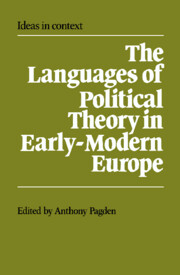Book contents
- Frontmatter
- Contents
- Notes on contributors
- Acknowledgements
- Introduction
- 1 The concept of a language and the métier d'historien: some considerations on practice
- PART I
- PART II
- PART III
- PART IV
- 13 The criticism of rhetorical historiography and the ideal of scientific method: history, nature and science in the political language of Thomas Hobbes
- 14 Saint-Simon and the passage from political to social science
- 15 Alexander Hamilton and the language of political science
- Index
- Ideas in Context
14 - Saint-Simon and the passage from political to social science
Published online by Cambridge University Press: 04 September 2009
- Frontmatter
- Contents
- Notes on contributors
- Acknowledgements
- Introduction
- 1 The concept of a language and the métier d'historien: some considerations on practice
- PART I
- PART II
- PART III
- PART IV
- 13 The criticism of rhetorical historiography and the ideal of scientific method: history, nature and science in the political language of Thomas Hobbes
- 14 Saint-Simon and the passage from political to social science
- 15 Alexander Hamilton and the language of political science
- Index
- Ideas in Context
Summary
In perhaps the most profound of several remarkable contributions to social theory, Michel Foucault has claimed that man as a subject of science was invented around the end of the eighteenth century. It was then, he contends in Les Mots et les choses, that our conceptions of labour, life and language were transformed from taxonomies of the mind, body and action into etiologies of forces, causes, and origins which the human sciences have ever since sought to uncover. In this metamorphosis of Western thought, the period from 1775 to 1795 is portrayed as decisive. During that interval, Adam Smith's perception of labour as the measure of value is judged to have been superseded by Ricardo's view of labour as productive activity which lay at the source of value – a principle held to be fundamental to the modern science of economics. Around the same time, Jussieu's classification of the structures and functions of bodily organs came to be replaced by Cuvier's account of an organic structural plan of living beings around which the science of biology has since been shaped. So too was Wilkins's theory of universal grammar, conceived as a system of verbal signs, supplanted by Bopp's analysis of language in terms of historical roots and origins, which have thereafter come to be traced by the modern science of philology.
- Type
- Chapter
- Information
- The Languages of Political Theory in Early-Modern Europe , pp. 325 - 338Publisher: Cambridge University PressPrint publication year: 1987
- 12
- Cited by



